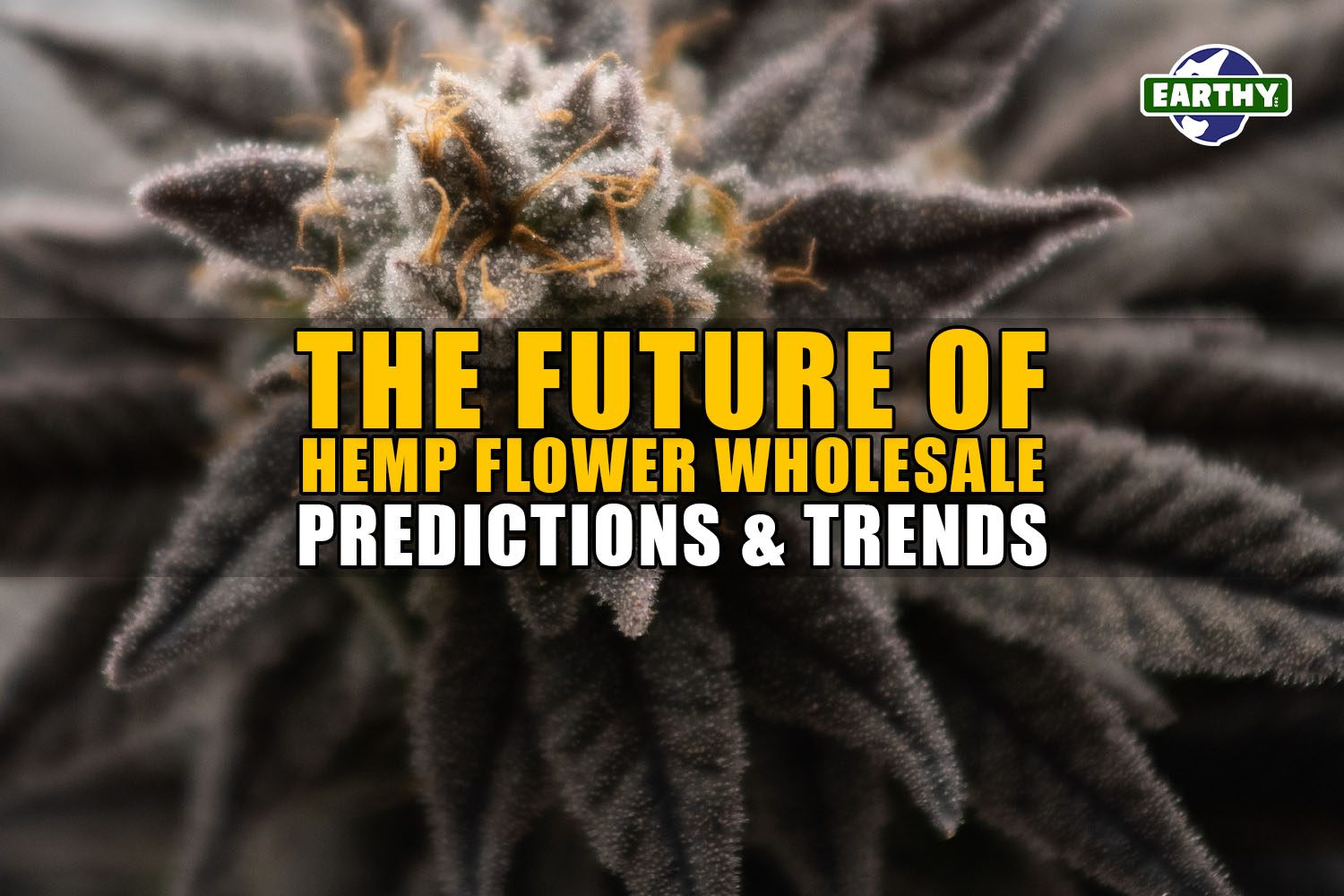The hemp industry has seen a remarkable evolution over the years, particularly since the passage of the 2018 Farm Bill. This legislation marked a turning point, legalizing the cultivation of industrial hemp and opening up vast opportunities for hemp farmers and growers across the United States [1]. Since then, hemp has held a significant position, both in terms of its economic value and its potential applications. As we delve into the future of hemp flower, we’ll explore various predictions and trends shaping this dynamic sector.
Current state of the hemp flower wholesale market
The hemp flower wholesale market has experienced unprecedented growth in recent years. For example, with increasing awareness about the wellness properties of cannabinoids like CBD, there has been a surge in the demand for hemp-derived products [2]. Key players in the hemp industry, including suppliers like Earthy Now, hemp advocates, and hemp growers, have all played crucial roles in driving the market forward. However, challenges such as regulatory uncertainties and questions about fluctuating THC levels continue to influence wholesale operations [3].
Predictions for the future of hemp flower wholesale
As hemp market experts look ahead, they’ve made several predictions regarding the future of wholesale hemp. For example, with more companies pursuing innovative formulations and delivery methods, hemp research continues to expand [4]. Hence, consumers will likely see a wider range of hemp extracts and novel hemp-derived products entering the market. Additionally, advancements in cultivation techniques and genetics may lead to the development of high-yielding hemp strains [5]. These may be specifically tailored for wholesale distribution.
When Will the Federal Government LEGALIZE IT?
Trends shaping the future of hemp production and distribution
Additionally, several trends are poised to shape the future of hemp. For example, sustainability is a key focus area, with the process of hemp cultivation taking center stage. Recognized for its potential to sequester carbon and reduce reliance on fossil fuels, hemp cultivation signals promising sustainability methods [6]. Moreover, the integration of hemp into various industries, including textiles and animal feed, highlights its versatility as a crop [7]. Additionally, boutique strains and specialty hemp flower varieties may further cater to the diverse preferences of consumers.
Technology in the CBD market
Technology and innovation drive transformative changes in the global CBD market, revolutionizing product development and distribution worldwide. For example, advanced technologies such as blockchain potentially enhance transparency and traceability throughout the supply chain. In other words, this technology enables companies to track the journey of CBD products from cultivation to distribution [8].
Additionally, AI-powered analytics provide valuable insights into consumer preferences and market trends. As a result, companies can use this data to tailor their product offerings to meet consumers’ evolving demands. Moreover, innovative extraction techniques and new products may bolster CBD products’ therapeutic properties. For example, novel hemp-based formulations and delivery methods may have the potential to offer enhanced efficacy and bioavailability [9].
Demand for new CBD formulations
In response to increasing demand for CBD products, forward-thinking companies focus on innovation to differentiate themselves and gain a competitive edge. For instance, emerging trends in product development include unique edible, smokable, and vapeable products containing a wide range of cannabinoids for enhanced wellness benefits. Furthermore, CBD-infused cosmetic products are popular among consumers seeking natural skincare solutions. Indeed, hemp-derived topical solutions have experienced significant growth as consumers recognize hemp’s potential benefits when absorbed through the skin [10]. These shifts drive market expansion in the beauty and wellness sectors.
Challenges and Opportunities
While the future of hemp flower holds immense promise, it has its challenges. For example, regulatory hurdles at the federal and state levels continue to pose obstacles for hemp farmers and businesses. Moreover, uncertainties surrounding THC levels and hemp licenses necessitate careful navigation of legal frameworks [11]. However, with the right strategies, these challenges can be turned into opportunities for growth and innovation.
Sustainability and ethical practices
Sustainability and ethical practices are increasingly paramount in the global CBD market as consumers demand accountability from companies. For example, as the CBD market expands, more companies seek sustainable sourcing of raw materials [12].
Companies like Earthy Now recognize the importance of minimizing environmental impact, from cultivation to production. Additionally, ethical considerations extend to labor practices and community engagement. Earthy Now strives to support local communities and ensure fair wages for workers involved in CBD and hemp product production.
Risks to consider
Despite the rapid growth projected for the hemp market, there are risks and challenges associated with ensuring sustainability. For example, one key challenge is the potential for overexploitation of hemp plants. This could lead to environmental degradation and depletion of natural resources. Moreover, ensuring ethical labor practices throughout the supply chain can be complex, particularly in regions where regulations may be lax. Thus, conscientious companies must navigate challenges while meeting increasing demand and maintaining financial performance. However, by prioritizing sustainability and ethical practices, companies can build trust and loyalty among consumers and employees.
Strategies for success in the changing market
To thrive in the evolving landscape of whole hemp flower, stakeholders must adopt strategic approaches. Diversification of product offerings, strategic partnerships, and investment in research are essential for staying competitive. Furthermore, staying abreast of regulatory developments and compliance requirements is crucial for long-term success in the industry.
Earthy Now understands emerging trends in the CBD market
With the wide selection of premium hemp CBD products available from Earthy Now, wholesale customers can achieve the competitive edge they need to succeed in the rapidly expanding CBD market.
Earthy Now’s premium hemp products are rich in cannabinoids and terpenes, providing the cleanest and most potent hemp products in the industry. Additionally, their products are low in THC per federal guidelines.
Here are some examples of Earthy Now’s popular wholesale products:
- CBD, CBN, and CBG Gummies
- Full-spectrum and Isolate CBD Lozenges and Tablets
- CBD Oils
- Topicals
- Premium CBD Flower
- Pet Products
- Pre-rolls
- CBD Smokes
Key takeaway: the future of hemp commerce
In conclusion, the future of hemp flower holds immense potential for growth and innovation. With shifting consumer preferences and advancements in technological and cultivation techniques, the hemp industry is on the brink of major expansion [13]. By embracing sustainability practices, exploring new market opportunities, and navigating regulatory challenges, stakeholders can capitalize on the burgeoning hemp flower wholesale market and shape its future trajectory.
Take charge of your position in the dynamic hemp industry by opening a wholesale account with wholesale account with Earthy Now. Stay ahead of the curve with premium hemp flower offerings and gain a competitive edge in this rapidly evolving market. With a commitment to quality, reliability, and customer satisfaction, Earthy Now ensures you can thrive amidst industry shifts. Don’t miss out on this opportunity to secure your place at the forefront of the hemp revolution.
Medical Disclaimer / Legal Disclaimer – Information is provided for educational purposes. It does not and is not intended to constitute legal advice or medical advice. We attempt to be accurate and up-to-date, but the legality of cannabinoids and the science of cannabis are evolving. The author is neither a legal professional nor a medical expert. Before buying or using any products, you should check with your local authorities and medical providers.
References
- Hemp Production and the 2018 Farm Bill
- Consumer Behavior Around Hemp Products in 2023
- Regulating Cannabis-Based Products
- CBD Delivery Systems
- The Latest in Hemp Technology
- Can Hemp Clean Up the Earth?
- Hemp’s Potential Across Various Industries
- How Blockchain Technology Can Revolutionize Hemp Supply Chain Issues
- Extraction Techniques for Bioactive Compounds of Cannabis
- Topical Cannabidiol (CBD) in Skin Pathology
- Navigating the Hemp Regulatory Maze
- Hemp and Sustainability
- Hemp Market Forecast





